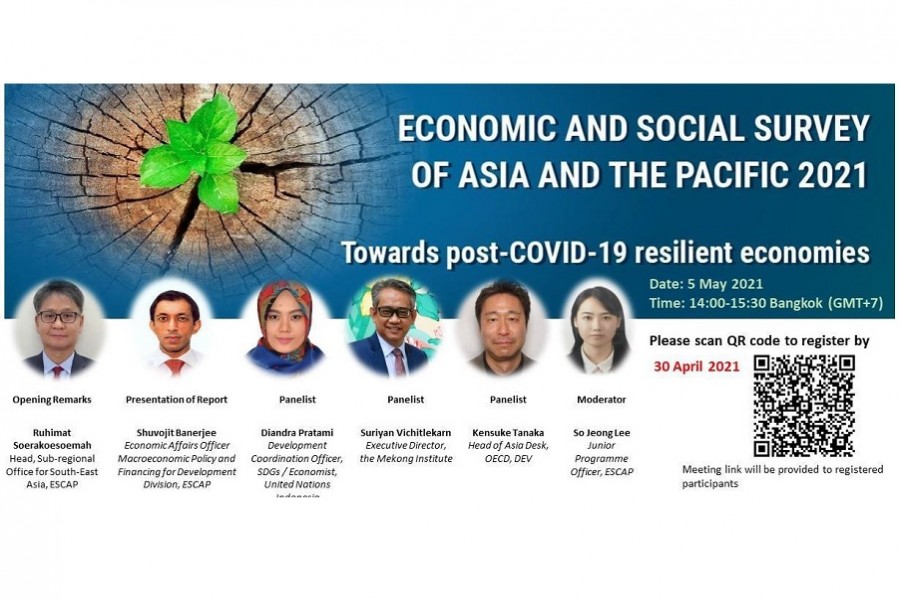Transforming regional framework into national actions

So Jeong Lee, Suriyan Vichitlekarn, and Ruhimat Soerakoesoemah
Published :
Updated :

As the world enters its second year of living with the Covid-19 pandemic, the focus has shifted from containing the spread of the disease towards recovering from socio-economic disruptions. Covid-19 recovery frameworks have been articulated throughout much of the last 12 months, with emphasis on streamlining regional and national development strategies across all levels. Most notable among regional plans is the ASEAN Comprehensive Recovery Framework launched by South-East Asian countries as an exit strategy from the pandemic.
Yet, to truly move ahead with the recovery, further efforts to align national actions with regional and international implementation can have a stronger impact. To better understand the support required by South-East Asian countries, the South-East Asia Policy Dialogue was organised in line with the launch of ESCAP's 2021 Economic and Social Survey of Asia and the Pacific: Towards Post-Covid-19 Resilient Economies.
Dr Shuvojit Banerjee of the ESCAP, a co-author of the report, emphasised how socio-economic impacts of the pandemic amplified the need for targeted investments in strengthening people and the planet. Thus, he called for continuity in policy support to build resiliency and invest in the 2030 Agenda, and applying a more integrated risk management approach to planning and policymaking. These core messages are reflected in the report, which outlines a "Building Forward Better" policy package that calls for investments in social services, digital access and green development, using fiscal space and a range of financing options.
Speakers Ms Diandra Pratami, an economist from the UN Resident Coordinator's Office in Indonesia, Mr Suriyan Vichitlekarn, Executive Director of the Mekong Institute, and Dr Kensuke Tanaka of the OECD Development Centre provided insights on actions required to effectively recover from the pandemic. Ms Pratami highlighted the importance of obtaining buy-in from the Indonesian Government to implement policy packages aimed at building back better, while Dr Tanaka shed light on policy responses such as reallocating resources towards digital health, e-learning, and industry 4.0 for South-East Asia.
As one of the major sub-regions of South-East Asia, the Mekong region faces distinct challenges. Mr Vichitlekarn underscored how the Mekong Institute has supported Mekong country representatives by enhancing their skills in translating regional policy frameworks and packages into actions suited to their national development strategies. Mekong Institute's peer-to-peer learning experiences and sharing of good regulatory practices across Cambodia, China, Lao People's Democratic Republic, Myanmar, Thailand and Viet Nam were also highlighted.
"By working together in sharing information and pooling resources, we can effectively address gaps and respond to priority needs in a holistic manner," he said. "In the long term, this proactive and inclusive approach will help level off divergent efforts in addressing food security, stabilising supply and value chains, and advancing environmentally-balanced strategies." Mr Suriyan further identified concrete actions in the Mekong region that can benefit from regional interventions. These include (i) protecting lives through the One Health Approach; (ii) safeguarding the vulnerable and marginalised through the development of the creative economy and inclusive domestic and intra-subregional markets; and (iii) keeping borders open and accelerating economic activities for micro, small and medium enterprises (MSMEs) through e-commerce and revitalised agricultural value chains and trade flows.
Overall, leveraging the Covid-19 pandemic as an opportunity to build forward better in South-East Asia requires cooperation at the national, sub-regional, regional and international levels. Cross-country collaboration across different spheres of government can strengthen the effectiveness of national mechanisms. It can also ensure that the Covid-19 agenda and sustainable development concepts are translated into localised actions for sustainable recovery and the timely achievement of the 2030 Agenda.
While the road to recovery remains uncertain, the past year has made one thing clear-through concerted actions at the national level, we will be able to put the pandemic behind us.
The piece is excerpted from
www. unescap.org/blog


 For all latest news, follow The Financial Express Google News channel.
For all latest news, follow The Financial Express Google News channel.